2013中考英语时态总复习(课件)
图片预览

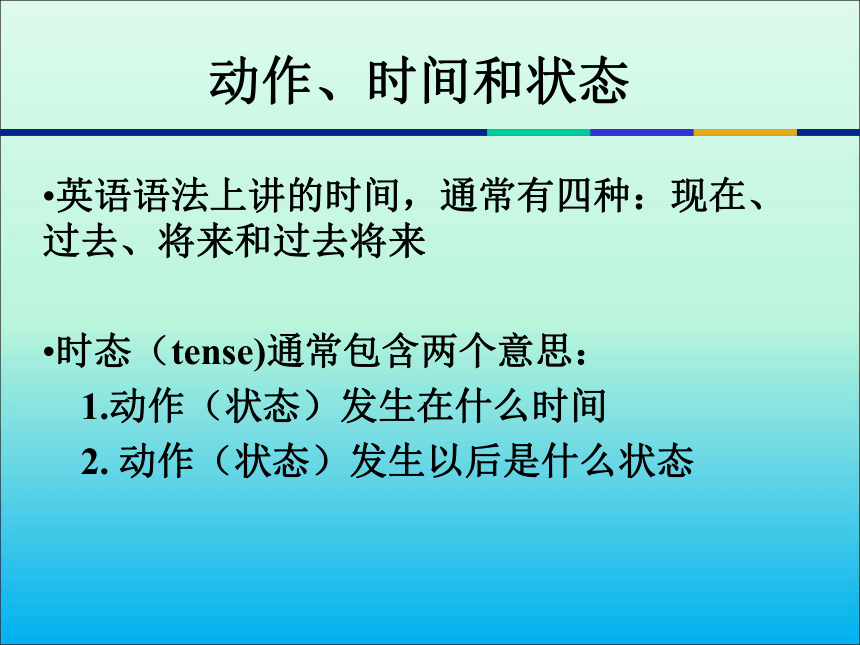
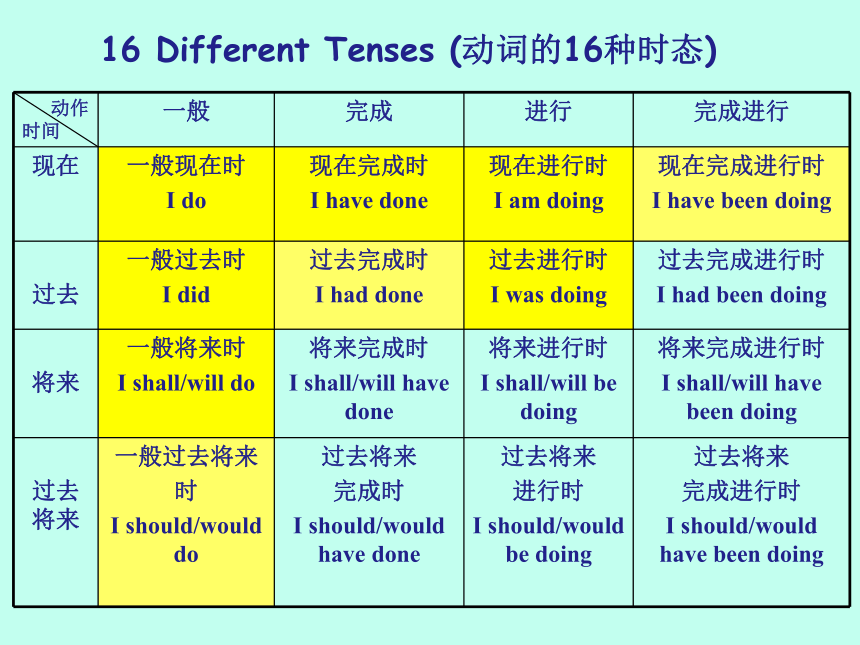
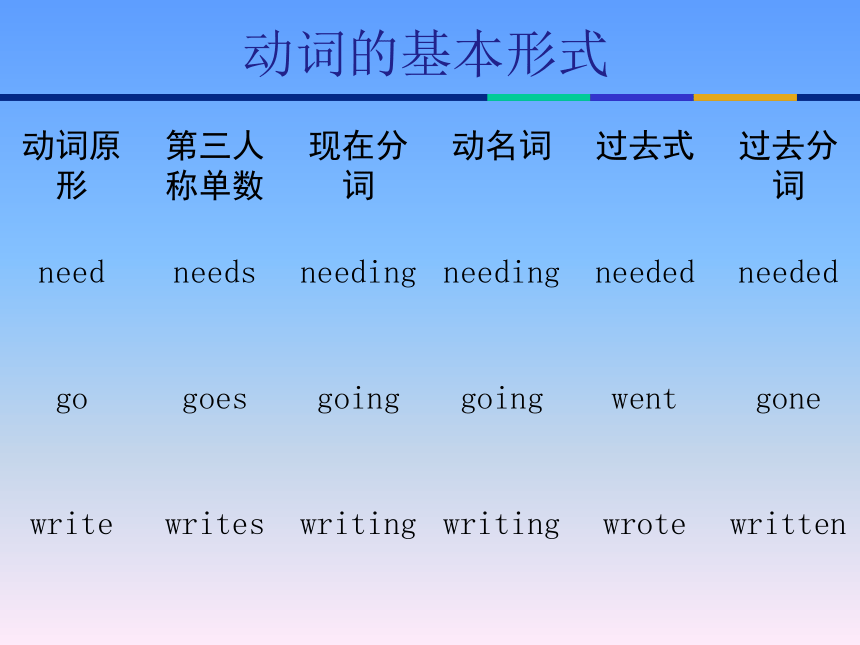
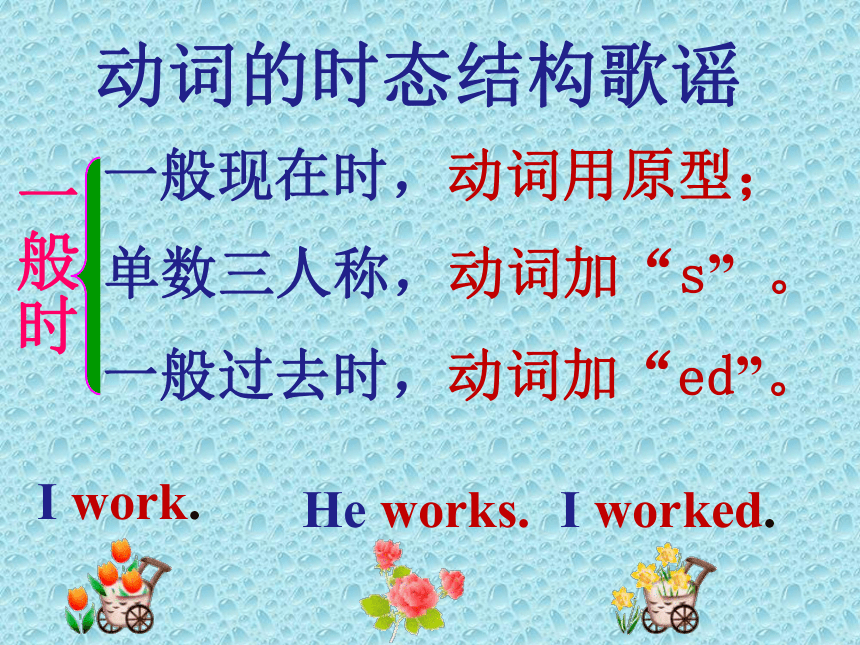
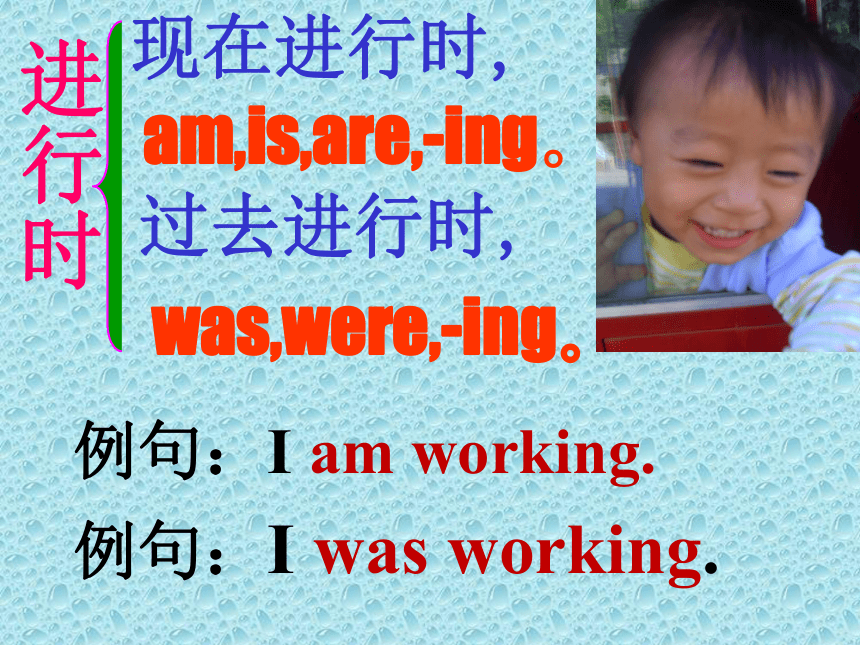
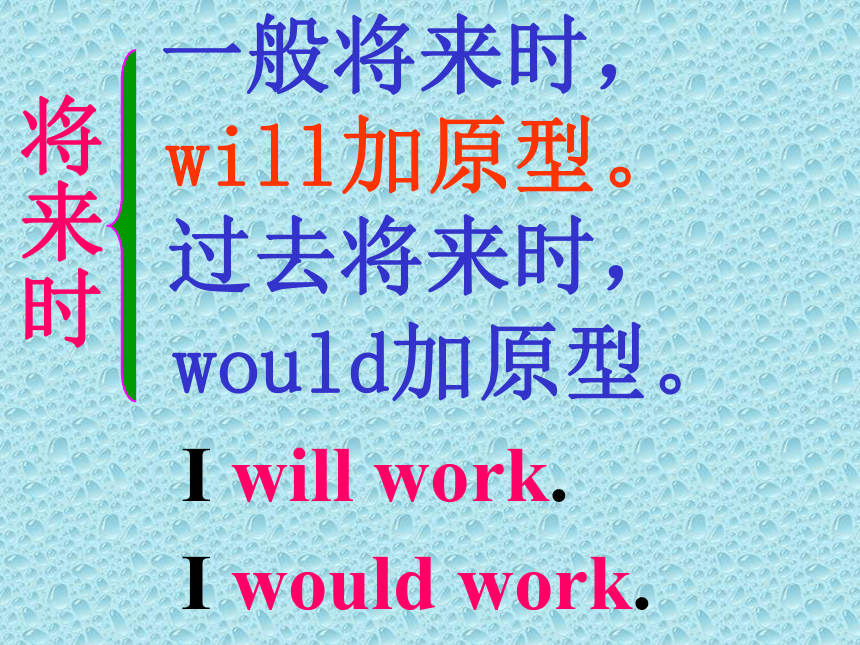
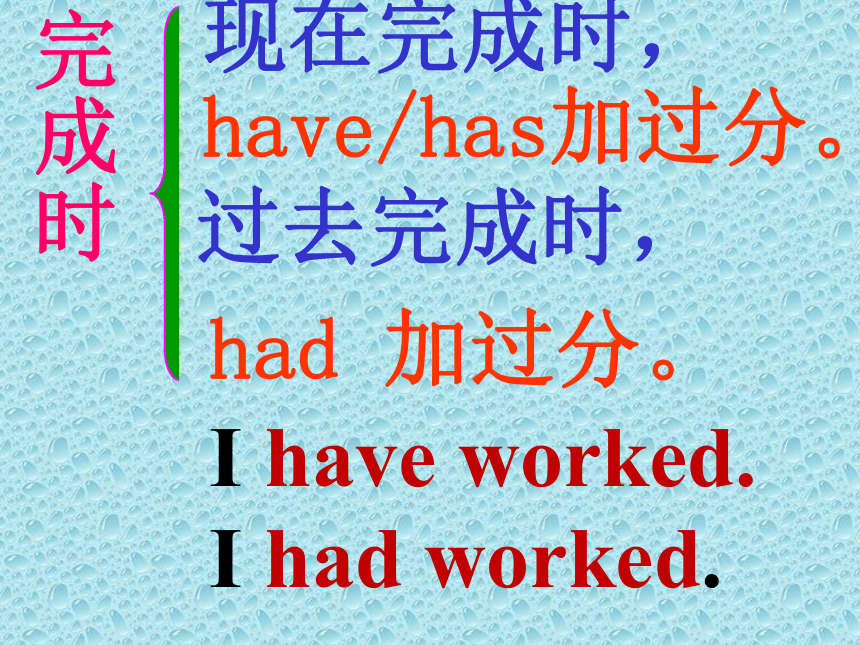
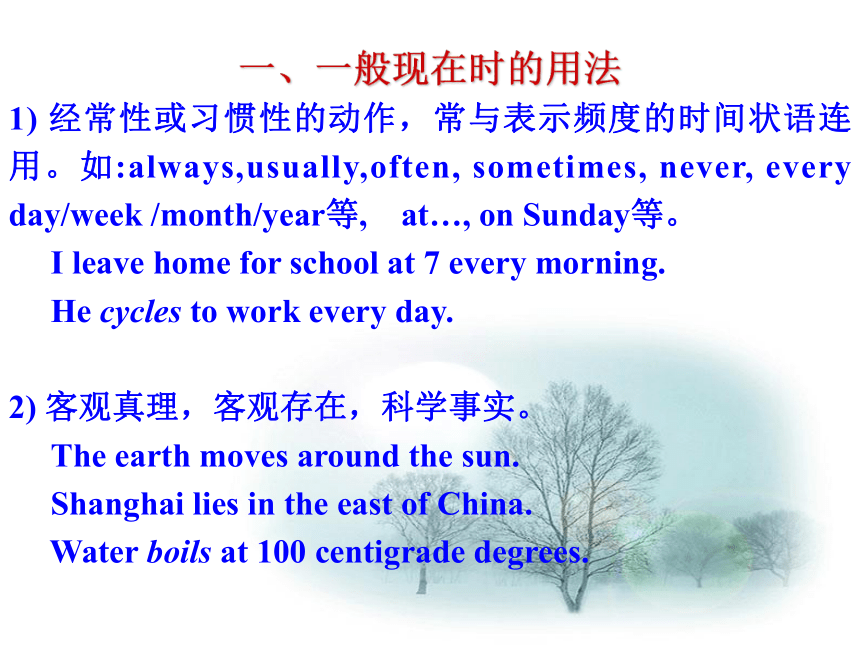
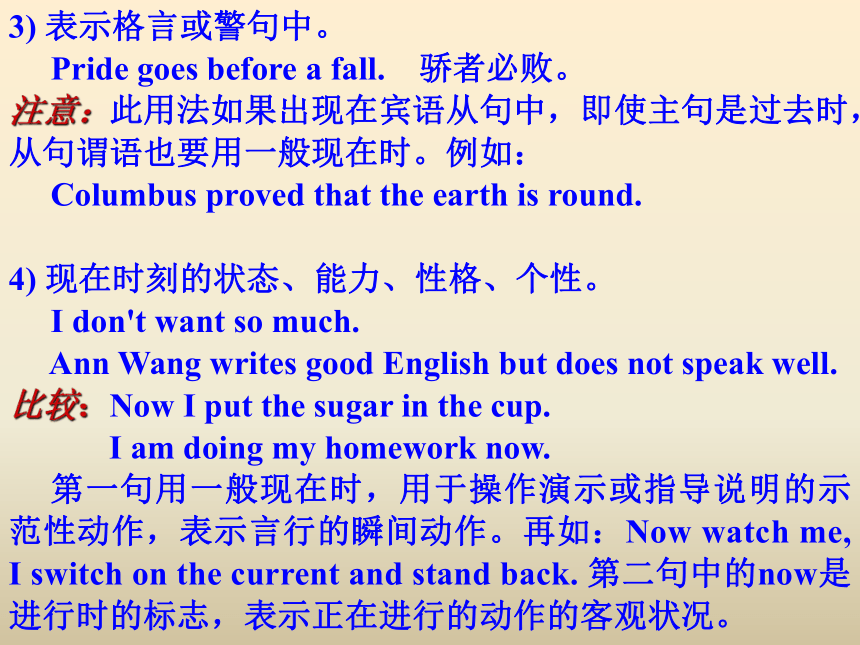
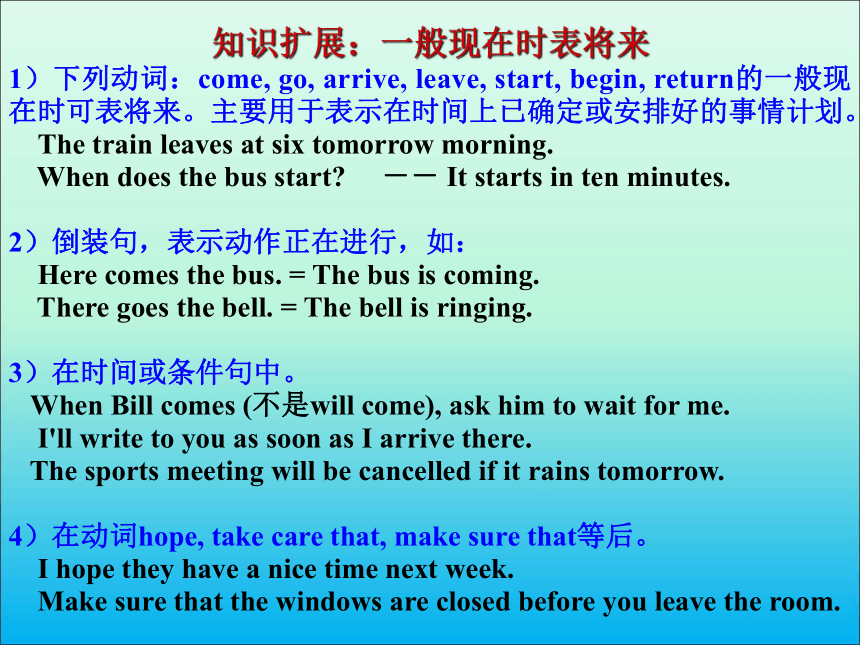
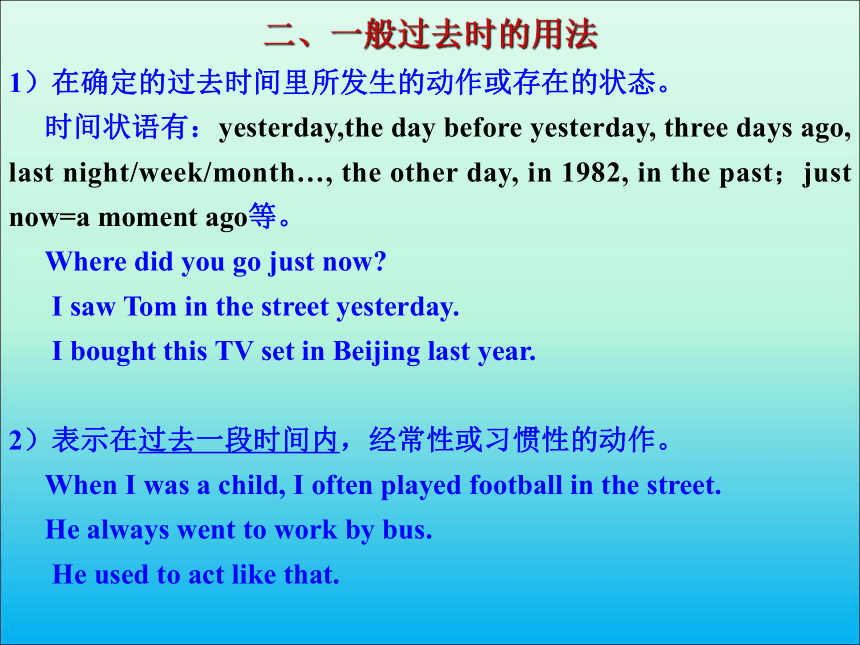
文档简介
课件87张PPT。英语的动词时态英语语法上讲的时间,通常有四种:现在、过去、将来和过去将来
时态(tense)通常包含两个意思:
1.动作(状态)发生在什么时间
2. 动作(状态)发生以后是什么状态动作、时间和状态16 Different Tenses (动词的16种时态)动词的基本形式动词的时态结构歌谣一般现在时,动词用原型;一般时单数三人称,动词加“s” 。一般过去时,动词加“ed”。I work.He works.I worked.现在进行时,进行时例句:I am working.过去进行时,am,is,are,-ing。was,were,-ing。例句:I was working.将来时一般将来时,
would加原型。过去将来时,will加原型。I will work.I would work.完成时现在完成时,have/has加过分。
I have worked.过去完成时,had 加过分。I had worked.一、一般现在时的用法1) 经常性或习惯性的动作,常与表示频度的时间状语连用。如:always,usually,often, sometimes, never, every day/week /month/year等, at…, on Sunday等。
I leave home for school at 7 every morning.
He cycles to work every day.
2) 客观真理,客观存在,科学事实。
The earth moves around the sun.
Shanghai lies in the east of China.
Water boils at 100 centigrade degrees. 3) 表示格言或警句中。
Pride goes before a fall. 骄者必败。
注意:此用法如果出现在宾语从句中,即使主句是过去时,从句谓语也要用一般现在时。例如:
Columbus proved that the earth is round.
4) 现在时刻的状态、能力、性格、个性。
I don't want so much.
Ann Wang writes good English but does not speak well.
比较:Now I put the sugar in the cup.
I am doing my homework now.
第一句用一般现在时,用于操作演示或指导说明的示范性动作,表示言行的瞬间动作。再如:Now watch me, I switch on the current and stand back. 第二句中的now是进行时的标志,表示正在进行的动作的客观状况。知识扩展:一般现在时表将来
1)下列动词:come, go, arrive, leave, start, begin, return的一般现在时可表将来。主要用于表示在时间上已确定或安排好的事情计划。
The train leaves at six tomorrow morning.
When does the bus start? -- It starts in ten minutes.
2)倒装句,表示动作正在进行,如:
Here comes the bus. = The bus is coming.
There goes the bell. = The bell is ringing.
3)在时间或条件句中。
When Bill comes (不是will come), ask him to wait for me.
I'll write to you as soon as I arrive there.
The sports meeting will be cancelled if it rains tomorrow.
4)在动词hope, take care that, make sure that等后。
I hope they have a nice time next week.
Make sure that the windows are closed before you leave the room.二、一般过去时的用法
1)在确定的过去时间里所发生的动作或存在的状态。
时间状语有:yesterday,the day before yesterday, three days ago, last night/week/month…, the other day, in 1982, in the past;just now=a moment ago等。
Where did you go just now?
I saw Tom in the street yesterday.
I bought this TV set in Beijing last year.
2)表示在过去一段时间内,经常性或习惯性的动作。
When I was a child, I often played football in the street.
He always went to work by bus.
He used to act like that. 3)用过去时表示现在,表示语气委婉礼貌。
(1)动词want, hope, wonder, think, intend 等。例如:
Did you want anything else?
I wanted to ask you about that.
Did you want to speak to me now?
I wondered if you could help me.
(2)情态动词 could, would,例如:
Could you lend me your bike?
Would you like something to drink?
4)用在条件句中表示与现在或将来事实不符的虚拟语气。
If I were a bird, I would fly to Beijing.
If he were here now, we could turn to him for help.三、一般将来时
1) shall用于第一人称,常被will 所代替。
will 在陈述句中用于各人称,在征求意见时常用于第二人称。
Which paragraph shall I read first?
Will you be at home at seven this evening?
2) be going to do表将来。
What are you going to do tomorrow?
Look at the dark clouds; there is going to be a storm.
3) be +不定式表将来,按计划或正式安排将发生的事。
We are to discuss the report next Saturday.
4) be about to +不定式,意为马上做某事。
He is about to leave for Beijing.
注意:be about to不能与tomorrow, next week 等表示明确将来时的时间状语连用。
四、现在进行时
1. 表示现在( 指说话人说话时) 正在发生的事情,常与now,Look! Listen! 等词连用。例如:We are waiting for you now.
listen! My son is singing with his friends.
2. 习惯进行:表示长期的或重复性的动作,说话时动作未必正在进行。例如: Mr. Green is writing another novel.
(说话时并未在写,只处于写作的状态。)
She is learning piano under Mr. Smith.
3. 表示渐变的动词有:get, grow, become, turn, run, go, begin等。
The leaves are turning red.
It's getting warmer and warmer.
4. 与always, constantly, forever 等词连用,表示反复发生的动作或持续存在的状态,往往带有说话人的主观色彩。
You are always changing your mind.知识扩展:不用进行时的动词
1) 事实状态的动词。如:have, cost, owe, weigh, continue等
I have two brothers.
This house belongs to my sister.
2) 心理状态的动词。如:know, realize, think see, believe, suppose, imagine, agree, remember, want, need, forget, prefer, mean, understand, love, hate等。
I need your help.
He loves her very much.
3) 瞬间动词。如:accept, receive, complete, finish, give, allow, decide, refuse等
I accept your advice.
4) 系动词。如:seem, lie, see, hear, smell, feel, taste, get, become, turn等
You seem a little tired.五、过去进行时
1)概念:表示过去某时正在进行的状态或动作。
2)过去进行时的主要用法是描述一件事发生的背景;一个长动作发生的时候,另一个短动作发生。
3) 常用时间状语有:at that time, this time yesterday,this morning, the whole morning, all day yesterday, from nine to ten last evening, as, when, while等,例如:
My brother fell while he was riding his bicycle and hurt himself.
It was raining when they left the station.
When I got to the top of the mountain, the sun was shining. 典型例题
1) Mary ___ a dress when she cut her finger.
A. made B. is making C. was making D. makes
答案C. 割伤手指是已发生的事情,应用过去时。同时,when表时间的同时性,"玛丽在做衣服时"提供事情发生的背景,因此用过去进行时。
2) As she ___ the newspaper, Granny ___ asleep.
A. read; was falling B. was reading; fell
C. was reading; was falling D. read; fell
答案B.句中的as = when, while,意为"当……之时"。描述一件事发生的背景时,用过去进行;一个长动作发生的时候,另一个短动作发生。句意为 "在她看报纸时,奶奶睡着了。"句中的 fell (fall的过去时),是系动词,后跟形容词,如:fall sick。 present(now)futurepast六、现在完成时1.现在完成时的构成:助动词have (has) + 动词的过去分词
注:has 用于第三人称单数,have 用于其他所有人称。 2.现在完成时的用法:
(1)现在完成时表示过去发生或已经完成的某一动作对现在造成的影响或结果。通常与already, just, yet, ever, never, before, 等状语连用。例如:
① I have never heard of that before.
② She has ever been to Beijin?
③ She has already finished the work.
④ Have you milked the cow yet? Yes, I have done that already.
⑤ I’ve just lost my science book.
有时没有时间状语;多是一般疑问句。presentpastI have bought an apple.One minute agonowI bought an apple.I have an apple.(2)现在完成时表示过去已经开始,持续到现在,也许还会持续下去的动作或状态。常与for+时间段,since+时间点或句子,so far(till now/up to now), recently, today, this week(month, year) ,in the past/last +时间段等。
① I haven’t seen her these days.
② She has learnt English for 3 years.
③ They have lived here since 1990.
④ What has happened to the USA in the last 350 years?
注意:表示短暂时间动作的词,如come, go, die, marry, buy等的完成时不能与for, since等表示一段时间的短语连用。 presentpastI have lived here for two years2 years agonowI lived here.I never move.I still live here.(3)经验性用法:表示从过去开始到目前为止这段时间中反复发生的动作或多次出现的状态。常与频度副词如often, always, every week, twice等连用,例如:
I have been to the Summer Palace twice.?我曾经去过颐和园两次。?
He has always said so.他总是这么说.
He has rung me up five times today. 他今天都给我打了五次电话了
(4)现在完成时还可以用在时间和条件状语从句中,表示将来某时完成的动作,例如:
I’ll go to your home when I have finished my homework.
我一做完作业就去你家。
If it has stopped snowing in the morning, we’ll go to the park.
如果早上雪停了,我们就去公园。can you distinguish?can you distinguish?去过
常与ever, never,
once,twice,连用 在…
与时间段连用
用how long 提问去了
说话时某人不在
只用于第三人称 Her sister _____________ Australia.
She left this morning.has gone to can you distinguish?去过
常与ever, never,
once,twice,连用 在…
与时间段连用
用how long 提问去了
说话时某人不在
只用于第三人称 A: Where is Bob ?
B: He ____________ Japan with
his sister. has gone to can you distinguish?去过
常与ever, never,
once,twice,连用 在…
与时间段连用
用how long 提问去了
说话时某人不在
只用于第三人称 A: I haven’t seen you for a long time.
Where _____ you _____?
B: I _____________ the United States. have been to have been can you distinguish?去过
常与ever, never,
once,twice,连用 在…
与时间段连用
用how long 提问去了
说话时某人不在
只用于第三人称 A: How long ____ you _______ China?
B: I _________ here for 3 years. have been have been in can you distinguish?去过
常与ever, never,
once,twice,连用 在…
与时间段连用
用how long 提问去了
说话时某人不在
只用于第三人称 A: _____ you ever ________ the city ?
B: No , never .Have been to can you distinguish?去过
常与ever, never,
once,twice,连用 在…
与时间段连用
用how long 提问去了
说话时某人不在
只用于第三人称 We ____________ Germany many
times in the past 3 years. have been to 1.where is Jim? He Wuhan.
2. My parents the Great Wall twice. They like there very much.
you ever the Happy valley?
How long Peter the West Hill farm?
My sister the shop. She will be back in two hours.
She Shanghai. She isn’t here.
She Shanghai. Now she is back.
She Shanghai for two yearshas gone to have been to Have been to hasbeen in has gone to has gone to has been to has been in 一般过去时与现在完成时之比较
1)过去时表示过去某时发生的动作或单纯叙述过去的事情,强调动作;现在完成时为过去发生的,强调过去的事情对现在的影响,强调的是影响。
2)过去时常与具体的时间状语连用,而现在完成时通常与模糊的时间状语连用,或无时间状语。
◎ 一般过去时的时间状语有:yesterday, last week,…ago, in1980, in October, just now, 具体的时间状语。
◎ 共同的时间状语有:this morning, tonight, this April, now, once,before, already, recently,lately等。
◎ 现在完成时的时间状语有:for, since, so far, ever, never, just, yet, till / until, up to now, in past years, always等不确定的时间状语。请大家认真分析比较下列各例句:
I saw a film yesterday. (强调看电影这个动作)
I have seen this film. (强调对现在的影响,电影的内容已知)
She has returned from Paris. (她已从巴黎回来了。)
She returned yesterday. (她是昨天回来了,强调行罚。)
He has been in the League for three years. (团员的状态可延续)
He joined the League three years ago. (三年前入团,强调行为)
Darby lived in Kentucky for seven years. (已不再住在肯塔基州)
Darby has lived in Kentucky for seven years. (现还住肯塔基州, 也有可能指刚离去)
注意:句中如有过去时的时间副词(如 yesterday, last week, in 1960)时,不能使用现在完成时,要用过去时。例如:
(错)Tom has written a letter to his parents last night.
(对)Tom wrote a letter to his parents last night. 典型例题:1. You don't need to describe her. I ___ her several times.
A. had met B. have met C. met D. meet答案B ;首先本题后句强调对现在的影响,我知道她的模样,你不用描述。再次,several times告知为反复发生的动作,因此用现在完成时。2. --- I'm sorry to keep you waiting.
--- Oh, not at all. I ___ here only a few minutes.
A. have been B. had been C. was D. will be答案A ; 等待的动作由过去开始,持续到现在,应用现在完成时。 延续动词与瞬间动词
1) 用于完成时的区别:
延续动词表示经验、经历; 瞬间动词表示行为的结果,不能与表示时间段的时间状语连用。
He has completed the work.
他已完成了那项工作。 (表结果)
I've known him since then.
我从那时起就认识他了。(表经历)
2) 用于till / until 从句的差异:
延续动词用于肯定句,表示“做……直到……” ;瞬间动词用于否定句,表示“到……,才……”。
He didn't come back until ten o'clock.
他到10 点才回来。
He slept until ten o'clock.
他一直睡到10点。瞬间动词和延续性动词
若句中出现时间段,则必须使用延续性动词。瞬间动词和延续性动词转换关系如下:1.The film began 5 minutes ago.
2.They left an hour ago.
3.The man died a week ago.
4.He joined the club 3 days ago.
5.They got married 10 years ago.
6.He came here an hour ago.
7.Jack got home 2 hours ago.
8.Mum opened the door just now.
9.They got to know 10 years ago.
10.I borrowed the book a week ago.
11.I bought the car a year ago.The film___ ___ ___ for 5 minutes.
They____ ____ ____for an hour.
The man___ ____ ____ for a week.
He___ ____ ___the club for 3 days.
They____ ____ _______for 10 years.
He___ ____ here since an hour ago.
Jack___ ____home for 2 hours.
The door___ ____open for a while.
They____ ______since 10 years ago.
I____ _____the book for a week.
I____ ____the car since a year ago.has been onhave been awayhas been deadhas been inhave been marriedhas beenhas beenhas beenhave knownhave kepthave had现在完成进行时的结构:
have(has) been +动词的现在分词
现在完成进行时表示的是:某个动作在过去的某个时刻发生以后,一直进行到目前此刻,这个动作也可能刚刚终止,也可能继续下去,通常和since + 时间点、for+时间段这类表持续性的时间状语配搭使用。
七、现在完成进行时例:I have been waiting for you for two hours
此句中,谓语动词have been waiting既不表示“等”这个动作的起点A,也不表示这个动作到目前此刻O点,而是表示这个动作经历了一段时间AO. AO=两小时,在这两小时内,“等”这个动作一直不断地进行。现在完成进行时AQOPwaitedHave been waiting1. 肯定句:“主语+have(has) been+动词的现在分词+其他.”
如:I have been sitting here all the afternoon.我在这儿坐了一下午。 He has been collecting all kinds of stamps since he was ten years old.自十岁起他就开始收集各式各样的邮票。
2. 否定句:“主语+have(has) not been+动词的现在分词+其他.
如:They haven't been meeting each other for five years. 他们有五年没见面了。 He hasn't been teaching here these years. 这些年他并没有一直在这儿教书。
3. 一般疑问句:“Have(Has) + 主语 + been + 动词的现在分词?”其肯定回答:“Yes, 主语 + have(has).”否定回答:“No, 主语 + haven't (hasn't).”
现在完成进行时句型结构1、在不用时间状语的情况下,现在完成进行时表示动作仍在进行。而现在完成时则表示动作在过去已结束。
I have read the book. 我读过这本书。
I have been reading the book. 我一直在读这本书。
The students have been preparing for the exam.
(还在进行)学生们一直在准备考试。
The students have prepared for the exam.
(已经结束)学生们为考试作了准备。
【注】有少数动词(如work, study, live, teach, stay等)在表示持续一段时间时用这两种时态含义差不多(只是用现在完成进行时更强调动作的持续性)。(如下面两个例子)
How long have you worked [been working] here?
你在这儿工作多久了?
I've lived [been living] here since 1988.
自1988年以来我就一直住在这儿。
现在完成进行时与现在完成时的区别2. 现在完成时通常只陈述事实,而现在完成进行时还可表示一种感彩。如:
I have waited for two hours. 我等了两小时。(陈述事实)
I have been waiting for two hours. 我等了两个小时 (等得好辛苦)
3.有些表示状态、感情、感觉的静态动词,如:have, like, hate, hear, know, sound等动词或不能用于现在进行时行一些动词通常也不用于现在完成进行时,但它们可以用于现在完成时。如:
I've only known her for two day. 我认识她刚刚两天。
They've been married for twenty years. 他们结婚已二十年了。
The war has lasted for a long time. 这场战争持续了很长时间。
4. 现在完成进行时不用于被动语态,若要用可用现在完成时的被动语态代替。如:
The house has been painted for a month. 这房子已漆了一个月。
八、过去完成时1.用法:发生在 过去的过去的动作。
They had got married when he came back. got married came back现在过去过去的过去我来晚了!没希望了!终于结婚了!好幸福呀!现在完成时1、概念:表示过去的过去。 -----------|----------------|--------------------|---->
过去以前 过去 现在
其结构是:had + 过去分词2、过去完成时的用法:
(1)过去完成时表示过去某一时刻或者某一动作之前完成的动作或状态;句中常用by, before, until, when等词引导的时间状语。
He said that he had learned some English before.
By the end of last year we had built five new houses.
I had learnt 5000 words before I entered the university.
By the time he was twelve, Edison had began to make a living by himself.
Tom was disappointed that most of the guests had left when he arrived at the party. (2)过去完成时的动词还可以表示过去某一时刻之前发生的动作或者状态持续到过去某个时间或者持续下去。
Before he slept, he had worked for 12 hours.
(3)在told, said, knew, heard, thought等动词后的宾语从句。
She said (that) she had never been to Paris.
(4)在过去不同时间发生的两个动作中,发生在先,用过去完成时;发生在后,用一般过去时。
When the police arrived, the thieves had run away.
(5)表示虚拟语气:
If we had left earlier, we wouldn’t have missed the train.时间现在过去那时所预见的情况八、一般过去将来时一、基本概念:
过去将来时表示从过去的某一时间看将要发生的动作或存在的状态。它是一个相对的时态,即立足于过去某时,从过去的某一时间看即将发生的事情就要用这一时态。
1) He said his mother would buy a bike for him
2) My brother told me he wouldn’t believe Jack any more.
3) Would it be all right if he knew his illness? 二、基本形式:
would/should+动词原形
(其中 would 用于各种人称, should 常用于第一人称)。
例如:
They were sure they would win the final victory.
他们坚信会赢得最后胜利。
He didn't expect that we should(would)all be there.
他没想到我们都在那里。
上述两个例句中的宾语从句谓语 would win 和 should(would)be 分别与其主句谓语 were sure 和 didn't expect 相对应。三、过去将来时的一些其它表达形式:
1.was/were+going to+动词原形
He said he was going to try. 他说他准备试试。
2.was/were+to+动词原形
They said the railway was to be opened to traffic on May Day. 他们说这条铁路将在五一节通车。
3.was/were about+动词原形
We were about to go out when it began to rain.
我们正要出去天(突然)下起雨来。
4.过去进行时(一般多为动作概念较强的动词,如 go,come, leave,start, open,begin 等)也可用于表示将来。
I didn't know when they were coming again.
我不知道他们什么时候再来。 四、用法注意点:
1.在时间和条件状语从句中,常用一般过去时来表示过去将来时。例如:
He said he would come to see you when he had time.
他说他有时间就来看望你。
2.“would+动词原形”可表示过去习惯性的动作。此时,不管什么人称,都可用would。
When he was a child he would get up early.
他年幼时,总是很早起床。 has beenhas workedhas been in has been in sincemember for 6.The bus left five minutes ago .
The bus _____ already ____ _____ for five minutes .
7.The girl bought a new school bag in September .
The girl _____ ____ the school bag since September .
8. The shop closed last winter .
The shop ____ ______ _______ since last winter .
9. The film began ten minutes ago .
The film _____ ____ _____ for ten minutes .
10. The dog died two days ago .
The dog _____ ______ _______ for two days .
11. The meeting ended last month .
The meeting _____ ____ ________ for a month . has been away has hadhas been closed has been on has been deadhas been over 用have/has been to, have/has gone to填空:
1.—Where is your brother?
—He ____________ the shop. He’ll be back soon.
2. — ______ you ever _________ to America?
—Yes, I ___________ New York twice.
3. —Here you are at last! Where _____ you _____?
—I _____________ London.
4. —David _______________ Australia.
—I’m sure he’s already arrived.
5. —Is Benny here?
—No, he __________ the school library. He left
five minutes ago.has gone toHave been tohave been tohave beenhave been tohas gone tohas gone to选择been , gone填空.
1.Jim is on holiday . He has ________ to Italy .
2. Hello ! I have just ________ to the shops . I have bought lots of things .
3.Alice is not here at the moment . She has ________ to the shop to get a newspaper .
4.Tom has _______ out . He will be back in about an hour .
5.“ Are you going to the bank ?” “No , I have already ________ there .”gonebeengonegonebeen根据情景用动词的适当形式填空
A: I ____________(not see) George since he__________ (leave) this school a year ago . ______ you ever _______(see) him again ?
B: Yes, I have. I ________(meet) him a few days ago .
A: Where _______ you _______ (meet) him ?
B: I _______ (meet) him in the museum . He was looking at some paintings when I ________ (see) him . We ________ (say) hello to each other .
haven’t seen lefthaveseenmetdid meetmetsawsaid1.I have borrowed the book for 2 weeks.
( )
2.The film has begun for 5 minutes.( )A B CA B CB kept B been on3. 这辆自行车我买了两年了。
I’ve _____ the bike _____ two years.4. He left Nanjing two years ago.
He _____ _____ _____ _____ Nanjing for two years.5. The monkey died last month.
The monkey _____ _____ _____ for a month.6. A: Hong long _____ you ____ ( )
B: Two weeks.
A.did,get ill B. have,fallen ill C. were,ill D. have,been illhad forhas been away fromhas been deadDThe shop has been _______ for an hour.
A. close B. closing C. closed
2. How long have you _____ the book?
A. borrowed B. kept C. bought
3. They ________ Guangzhou for an hour.
A. left B. have left C. have been away from
4. I have ______ Foshan since ten years ago.
A. come to B. arrive in C. been in
5. I bought a computer ________.
A. for two days B. since two days ago
C. two days ago
Class has been over __________.
A. just now B. for a moment C. a moment ago
7. I have come back _______.
A. for an hour B. yet C. already
CBCCCBC2) He joined the Party two months ago .
He _____ _____ ____ Party member for two months.
He _____ _____ ____ the Party since two years ago.
It is two months ______ he ______ the Party.has been a has been insince joined1) I ________ a bike . I ______ the bike a week ago .
I _________________ the bike for a week .(买了)
2) He ______ . He _____________ for two days . (死了)have boughtboughthave hadhas diedhas been dead这只狗死了。
这只狗昨天死了。
这只狗一天前死了。
这只狗死了一天。
The dog has died.
The dog died yesterday.
The dog died a day ago.
The dog has been dead for a day._____________________________________________________________________________________________他们离开和顺了。
他们两天前离开和顺了。
他们自从两天前就离开和顺了。/ 他们离开和顺两天了。 They left Heshun.
They have left Heshun.They left Heshun two days ago._________________They have been away from Heshun
since two days ago. ____________________________________________________They have been away from Heshun
for two days. ______________________________________戏剧开始了。
戏剧半小时前开始了。
戏剧开始半个小时了。
我买了一台电脑。
自从我来到这里就买了一台电脑。
The play has begun.
The play began half an hour ago.
The play has been on for half an hour.I have bought a computer.
I have had a computer since I came here.1. The old man _____ two days after he had been sent to hospital. ?
A. died B. would die C. had died D. has died ?
2. Old McDonald gave up smoking for a while, but soon ______ to his old ways. ?
A. returned B. returns C. was returning D. had returned ?
3. I _____ my son _____ a doctor, but he wasn’t good enough at science. ?
A. hoped; would become B. had hoped; would become ?
C. had hoped; will become D. hope; will become ?
4. I _____ to take a good holiday this year, but I wasn’t able to get away. ?
A. hope B. have hoped C. had hoped D. hoped ?
5. Helen _____ her key in the office so she had to wait until her husband _____ home.
A. has left; comes B. left; had come
C. had left; came D. had left; would come ?中考英语时态真题集锦。
PART ONE
1.——What do you do?
——I’m an engineer. I _____ in a company in Wuhan. I like my job very much.
A. work B. had worked C. will work D. worked
2.—Is your father a doctor? —Yes, he is. He__________ in Town Hospital.
A. has worked B. had worked C. works D. worked
3. Every year many foreigners _________to China to learn Chinese.
A. have come B. comes C. came D. come
4.My mother will take me to the movie if she _________ free this weekend.
A. is B. will be C. was D. would be
5. The girls will have a trip if it _________fine.
A. is B. was C. will be D. has been
√√√√√中考英语时态真题集锦。
PART TWO
6.——What’s the best food have you had in Beijing, Alex?
—Roast duck! I __to a famous restaurant to have it last week.
A. have gone B. go C. will go D. went
7.——Do you know how many gold medals the 23-year-old Michael Phelps _____at the 2008 Summer Olympic Games?——Eight.
A. win B. wins C. won D. has won
8. We were in Qingdao last week and _______ great fun there.
A. will have B. have had C. had D. have
9. I’m sorry you’ve missed the train. It ______10 minutes ago.
A. left B. has left C. had left
10.——What did the teacher say just now?
——He _________us not to play computer games all day.
A. tells B. told C. has told D. is told
√√√√√中考英语时态真题集锦。
11.——When ___________ for Hong Kong, do you know?
——I’m not sure. When he ______, I’ll let you know.
A. he leaves ;leaves B. will he leave; will leave
C. he leaves; will leave D. will he leave; leaves
12.——Where will they go next Sunday?—They ____to the Great Wall.
A. will go B. go C. has gone D. went
13.——Has he returned the library book yet?
——Not yet. Don’t worry. He ______it soon.
A. returned B. has returned C. will return D. returns
14. He doesn’t tell me when he_____. I’ll call you up as soon as he ____.
A. will come, arrives B. comes, arrives C. will come, will arrive
15. If it_________ tomorrow, we_____ travel outside.
A. will rain; will B. rains; won’t C. will rain; won’t
16.——Jim, can you help me to wash the dishes?—Sorry, Dad. I___ to the shop.
A. go B. went C. am going D. have been √√√√√√中考英语时态真题集锦。
17. Li Ming said he ___happy if Brian___to China next month.
A.as; come B. was; would come
C. would be; came D. will be; come
18. —What did your son say in the letter??—He told me that he ___ the Disney World the next day.
A. will visit??B. has visited????C. is going to visit??D. would visit
19. I hoped Tina ______ to my birthday party on time the next Wednesday.
A. to come? B. is coming C. will come? D. was coming
20. We were not sure whether they ______ more vegetables.
A. are going to grow? B. were going to grow
C. will grow???? ???D. have grown√√√√21.——Where’s Susan, Mike?——She ______ in the kitchen.
A. cooks B. cooked C. is cooking D. has cooked
22.——Have you got a job offer?——Not yet. I ___________.
A. waited B. am waiting C. wait D. was waiting
23.——Do you think John will help me move the piano?
——You’d better not ask him. He _______ a composition.
A. write B. writes C. is writing D. wrote
24.——Where’s the children, Mr Black?
——Oh, they ________ their PE lesson on the playground.
A. have B. had C. are having D. have had
25.——Listen,who ______ in the room?——Let’s go and see.
A. is crying B. crying C. cry D. cries√√√√√26.——I didn’t see you when I came here last night. Where were you?
——I ___________ my project at home.
A. designed B. have designed C. would design D. was designing
27. My mother ____________ dinner when I came back.
A. cooks B. has cooked C. is cooking D. was cooking
28.—— I called you yesterday evening, but there was no answer.
——Oh.I'm sorry. I___________ dinner at my friend’s home.
A. had B. was having C. have had
29. What__________ when your mother called you up?
A.are you doing B. did you do C.you were doing D. were you doing
30. ——I called you at half past nine this morning, but there was no answer.
——Oh, sorry. I _________with my cousin in the supermarket.
A. shop B. was shopping C. shopped D. will shop
31.——I knocked into a tree when I went to the railway station for my friend. ——I suppose you ___________too fast.
A. drive B. are driving C. drove D. were driving √√√√√√32. When I went to say goodbye to Anna, she _____ the piano.
A. is playing B. plays C. was playing D. played
33. His parents wanted to know what he _______ at that time.
A. is doing B. was doing C. has done D. will go
34.——Dick gave me a note while I ____in the library.
——I guess he made it to say “sorry” to you
A. am reading B. was reading C. reads D. will read
35.——You were out when I dropped by your house.
——Oh, I _______for a friend from England at the airport.
A. was waiting B. had waited
C. am waiting D. have waited
36. Last night I ______ the homepage for my class when my friend call me.
A. designed B. has designed C. was designing D. would design
37.——What did the teacher say just now?
——Sorry. I didn’t catch it. I _____________something else.
A. think B. will think C. was thinking D. had thought√√√√√√38. --- _________ the latest Time magazine ________yet?
-----Sorry, it’s late. Maybe tomorrow.
A. Will; arrive B. Has; arrived C. Do; arrive D. Did; arrive
39. Susan isn’t here now. She ___ to England. She will come back next month.
A. has been B. has gone C. goes D. went
40.——How long ________Korean singer Jang Nara _________China?
——Four years. She can speak and sing in Chinese.
A. does; go to B./; was in C. has; been to D. has; been in
41.——Would you like to see the film with me?
——I’m sorry I ________ it twice.
A. see B. am seeing C. saw D. have seen
42.——___________you __________your dictionary?
——No, so I have to buy a new one today.
A. Did; find B. Have; found C. Are; finding D. Had; found
43.——______you ______the film Harry Potter 5?
——Not yet. I’ll see it this Sunday.
A. Did; see B. Are; seeing C. Have; seen D. Do; see√√√√√√44. I won’t forget my teacher because she_____ so kind to me since I came to this school.
A. has been B. will be C. has D. is
45.——May I speak to Tom?
——Sorry, he is not at home. He _________ to Shanghai.
A. has been B. has gone C. goes D. went
46. In the past few years there ____ great changes in my hometown.
A. have been B. were C. had been D. are
47. Henry speaks Chinese very well. He _____ in China since 2002.
A. stays B. stayed C. is staying D. has stayed
48.—Chen Jie, the workers_______ our new library already.
—Really? I’ll go there and borrow some books.
A.decorated B. are decorating
C. have decorated D. were decorated√√√√√49.——It’s raining! When did it start?
——I don’t know exactly. In fact, it __________all this afternoon.
A. lasts B. has lasted C. lasted D. have been lasting
50.—Are you going to see the film with us? —No, thanks. I ____ it.
A. saw B. have seen C. see D. was seeing
51.——They say there's a new restaurant nearby.
——Yes,and it_________ for no more than a week.
A.has been open B.opens C.has opened D.opened
52.—Kitty,will you go to see the film Cold Mountain this evening?
——No,I won't. I__________ it already.
A.saw B.have seen C.see D.will see
53.——How long ___________ the film KING KONG_______?
——For just several minutes.
A.did,begin B. has,begun C.has, been on√√√√√1. — Look! How wonderful my car is! Oh, Jack. What are you thinking about? Don’t you like it?
— I’m sorry I ______ any remark about it in time. I certainly think it’s smart.
A. wasn’t making???? B. don’t make???
C. won’t make???????? D. didn’t make
2. To find the street where I lived in my childhood is no easy task because the city ______ so rapidly all these years.
A. is changing???????? B. has changed??????
C. will have changed???????? D. will change
3. He ______ quite well, but he hasn’t had time to swim since this summer.
A. will swim?????? B. have swum??? C. swam??????????? D. swims
4. Jimmy said that he would come to pick me up, but he ____by now.
A. hasn’t turned up???? B. doesn’t turn up????
C. won’t turn up???????? D. hadn’t turned up5. I’m terribly sorry for being late, but I _____ the wrong bus.
A. catch????????? B. had caught?????? C. caught?????????????D. catching
7. The truth, sir, is that the old man _______ across the road when my car hit him.
A. was to walk???????? B. had been walking????
C. walked?????????? D. was walking
8. I really don’t think Rose will be upset, but I will go and see her in case she _____.
A. is?????????????????? B. does?????????? C. will be??????????????D. has been
9. The computers made by our company sell best, but several years ago no one could have imagined the role in the markets that they _________.
A. were playing?????????? B. were to play????
C. had played???????????? D. played10. — Kate is in hospital.
— Oh, really? I _______. ________ visit her.
A. didn’t know; I’ll go and?????? B. don’t know; I’ll go and
C. don’t know; I’m going to???????? D. didn’t know; I’m going to
11. — Where _______ the guidebook? I can’t see it anywhere.
— I _______ it right here, but now it’s gone.
A. did you put; have put???????????? B. had you put; have put
C. have you put; put?????????????????? D. were you putting; put
14. — Do you live in this city?
— No, we ______ it for holidays.
A. just visit???? B. just visited?? C. are just visiting?? D. have visited
15. — How is the old man now?
— Sorry, he ______ though they did all they could to save him.
A. was dead????????B. had died?????? C. has been dead?????? D. died16.The lake will be further polluted unless some measures ______.
A. will be taken???? B. are taken?????C. were taken?? D. had been taken
17. I’m afraid it will be two months ______.
A. when I come back?? B. when I’ll come back??
C. before I come back?? D. before I’ll come back
18.The workers _____ busily when the boss came to look for something he ______ in the office.
A. had worked, had left?? B. were working ; had left
C. working ; had left?? D. had worked; left
21.The notice ______ “No smoking”.??
A. is told???? B. reads?????????? C. tells?????? D. is read动词不规则变化(1) AAA型(动词原形、过去式、过去分词同形)
cost(花费) cost ????? cost????????????????????????????
cut(割)????? cut????????? cut
hit(打)????? ? hit????????? ? hit???????????????????????????????
hurt 伤害)??? hurt??????? hurt
let(让)????????? let????????? ? let????????????????????????
? put(放)??? ? put????????? put
read (读)??? read?????? ? read????????????????????????????
(2) AAB型(动词原形与过去式同形)
beat(跳动)??????? beat??????? beaten
(3) ABA型(动词原形与过去分词同形)
become(变成)?? became?? become??????????????
?? come(来)?? came?????? come
run(跑)???????????? ran????????? run
(4) ABB型(过去式与过去分词同形)
dig(挖)??????? dug???????? dug?????????????????????
get(得到)????????? got????????? got
hang(吊死)?? hanged??? hanged?????????????
?hang(悬挂)??????? hung?????? hung
hold(抓住)?? held??????? held??????????????
?shine(照耀)?????? shone????? shone
sit(坐)???????? sat????????? sat???????????????????
win? (赢)?????????? won??????? won
meet(遇见)?? met???????? met????????????????????
keep (保持)?????? kept??????? kept
sleep(睡)??? slept??????? slept?????????? ?????
sweep(扫)???????? swept????? swept
feel(感觉)?? ? felt????????? felt????????????????
smell(闻)????????? smelt?????? smelt
leave(离开) ?left????????? left?????????????????
build(建设)?????? built??????? built
lend(借出) ?lent???????? lent???????????????????
send (传送)?????? sent??????? sent
spend(花费)? ?spent?????? spent???????????
lose? (丢失)?????? lost???????? lost
burn (燃烧) burnt?????? burnt?????
?learn(学习)?????? learnt????? learnt
mean(意思是) meant????? meant???????????
catch(抓住)????? caught???? caught
teach(教)??????? taught???? taught?????????????
bring(带来)?????? brought?? brought
fight (战斗)???? fought???? fought???????????
buy(买)??????????? bought??? bough
think(想)???????? thought?? thought????????
hear (听见)??????heard????? heard
sell(卖)?????? ? ?sold??????? sold??????????????????
? tell(告诉)??????? told???????? told
say(说)??????? said???????? said??????????????????
find(找到)????????found????? found
make(制造)?????made????? ? made
stand(站)? stood????? stood????????????????????
?understand明白 understood? understood
?
(5) ABC型(动词原形、过去式与过去分词三者不同形)
begin(开始)?????? began????? begun????????
??drink(喝)????????? drank????? drunk
ring(铃响)??????? ?rang??????? rung?????????????????
sing (唱)?????????? sang??????? sung
swim(游泳) ? swam????? swum?????????????????
blow(吹)?????????? blew????????????blown
draw???(画) drew????????????drawn?????????
fly(飞)???????? flew??????? flown
?know(知道)????? knew????? known
throw(投掷)????? threw???? thrown????????
show(出示)????? showed?? shown
break(打破)????? broke????? broken??????
choose(选择)?? chose????? chosen
forget(忘记)??? ?? forgot???? forgotten (forgot)?
?speak(说,讲)?? spoke????? spoken
wake(醒)????????? woke????? woken??????????????????
? drive(驾驶)?????? drove????? driven
eat(吃)????????????? ate????????? eaten?????????????
???fall(落下)????????? fell????????? fallen
give(给)??????????? gave??? given????????????????
???rise(升高)???????? rose??????? risen
take(取)????????? ?? took??????? taken?????????
?mistake(弄错)?? mistook?? mistaken
ride(骑)???? ???? rode??????? ridden???????????
write(写)???????? wrote????? written
do(做)????????????? did????????? done???????????????
go(去)????????????? went??????? gone
lie(平躺)????????? ? lay????????? lain?????????????????
see(看见)????????? saw??????? seen
wear??(穿)??? wore????????????? worn
?be ( am, is, are )(是)????? was, were????????? been?
写出下列动词的过去式及过去分词。
1 leave -________-_______
2 catch-________--________
3 tell-________--_________
4 stand-______--______
5 get-_______--________
6 hurt-________--_________
7 put-_______--_________
8 come-_______--________
9 run-________--_________
10 begin-________--_________
11 swim-_________--________
12 draw-_________--_________
13 know-________--__________
14 do-_______--________
15 go-_______--_________16 give-_______--_______
17 see-_______--________
18 drive-_______--________
19 take-______--_______
20 be-________--________
21 eat-_____--______
22 write-_______--______
23 speak-______--________
24 steal-_______--________
25 tear-_______--________ left left caught caught told told stood stood got got hurt hurt put put came come ran run began begun swam swum drew drawn knew known did done went gone gave given saw seen drove driven took taken was,were been ate eaten wrote written spoke spoken stole stolen tore tornPlease remember them.sendsingshakesitsleepspeakspendstandstealswimteachthinktellthrowunderstandwakewearwinwritetakesent sentshook shakensang sungsat satslept sleptspoke spokenspent spentstood stoodstole stolenswam swumtaught taughttold toldthought thoughtthrew thrownunderstood understoodwoke wokenwore wornwon wonwrote writtentook taken用for 或since填空
1.?????? Jill has been in Ireland _________ Monday.
2.?????? Mr. Jason has been in Paris _______ three days.
3.?????? My aunt has lived in Australia_______15days.
4.?????? Margaret is in her office. She has been there _______7 o’clock.
5.?????? India has been an independent country ______ 1974.
7.?????? Nobody lives in those houses. They have been empty______ many years.
8.?????? Mike has been ill ________ a long time. He has been in hospital ______ October.
sinceforforsincesinceforforsinceThanks for listening!
时态(tense)通常包含两个意思:
1.动作(状态)发生在什么时间
2. 动作(状态)发生以后是什么状态动作、时间和状态16 Different Tenses (动词的16种时态)动词的基本形式动词的时态结构歌谣一般现在时,动词用原型;一般时单数三人称,动词加“s” 。一般过去时,动词加“ed”。I work.He works.I worked.现在进行时,进行时例句:I am working.过去进行时,am,is,are,-ing。was,were,-ing。例句:I was working.将来时一般将来时,
would加原型。过去将来时,will加原型。I will work.I would work.完成时现在完成时,have/has加过分。
I have worked.过去完成时,had 加过分。I had worked.一、一般现在时的用法1) 经常性或习惯性的动作,常与表示频度的时间状语连用。如:always,usually,often, sometimes, never, every day/week /month/year等, at…, on Sunday等。
I leave home for school at 7 every morning.
He cycles to work every day.
2) 客观真理,客观存在,科学事实。
The earth moves around the sun.
Shanghai lies in the east of China.
Water boils at 100 centigrade degrees. 3) 表示格言或警句中。
Pride goes before a fall. 骄者必败。
注意:此用法如果出现在宾语从句中,即使主句是过去时,从句谓语也要用一般现在时。例如:
Columbus proved that the earth is round.
4) 现在时刻的状态、能力、性格、个性。
I don't want so much.
Ann Wang writes good English but does not speak well.
比较:Now I put the sugar in the cup.
I am doing my homework now.
第一句用一般现在时,用于操作演示或指导说明的示范性动作,表示言行的瞬间动作。再如:Now watch me, I switch on the current and stand back. 第二句中的now是进行时的标志,表示正在进行的动作的客观状况。知识扩展:一般现在时表将来
1)下列动词:come, go, arrive, leave, start, begin, return的一般现在时可表将来。主要用于表示在时间上已确定或安排好的事情计划。
The train leaves at six tomorrow morning.
When does the bus start? -- It starts in ten minutes.
2)倒装句,表示动作正在进行,如:
Here comes the bus. = The bus is coming.
There goes the bell. = The bell is ringing.
3)在时间或条件句中。
When Bill comes (不是will come), ask him to wait for me.
I'll write to you as soon as I arrive there.
The sports meeting will be cancelled if it rains tomorrow.
4)在动词hope, take care that, make sure that等后。
I hope they have a nice time next week.
Make sure that the windows are closed before you leave the room.二、一般过去时的用法
1)在确定的过去时间里所发生的动作或存在的状态。
时间状语有:yesterday,the day before yesterday, three days ago, last night/week/month…, the other day, in 1982, in the past;just now=a moment ago等。
Where did you go just now?
I saw Tom in the street yesterday.
I bought this TV set in Beijing last year.
2)表示在过去一段时间内,经常性或习惯性的动作。
When I was a child, I often played football in the street.
He always went to work by bus.
He used to act like that. 3)用过去时表示现在,表示语气委婉礼貌。
(1)动词want, hope, wonder, think, intend 等。例如:
Did you want anything else?
I wanted to ask you about that.
Did you want to speak to me now?
I wondered if you could help me.
(2)情态动词 could, would,例如:
Could you lend me your bike?
Would you like something to drink?
4)用在条件句中表示与现在或将来事实不符的虚拟语气。
If I were a bird, I would fly to Beijing.
If he were here now, we could turn to him for help.三、一般将来时
1) shall用于第一人称,常被will 所代替。
will 在陈述句中用于各人称,在征求意见时常用于第二人称。
Which paragraph shall I read first?
Will you be at home at seven this evening?
2) be going to do表将来。
What are you going to do tomorrow?
Look at the dark clouds; there is going to be a storm.
3) be +不定式表将来,按计划或正式安排将发生的事。
We are to discuss the report next Saturday.
4) be about to +不定式,意为马上做某事。
He is about to leave for Beijing.
注意:be about to不能与tomorrow, next week 等表示明确将来时的时间状语连用。
四、现在进行时
1. 表示现在( 指说话人说话时) 正在发生的事情,常与now,Look! Listen! 等词连用。例如:We are waiting for you now.
listen! My son is singing with his friends.
2. 习惯进行:表示长期的或重复性的动作,说话时动作未必正在进行。例如: Mr. Green is writing another novel.
(说话时并未在写,只处于写作的状态。)
She is learning piano under Mr. Smith.
3. 表示渐变的动词有:get, grow, become, turn, run, go, begin等。
The leaves are turning red.
It's getting warmer and warmer.
4. 与always, constantly, forever 等词连用,表示反复发生的动作或持续存在的状态,往往带有说话人的主观色彩。
You are always changing your mind.知识扩展:不用进行时的动词
1) 事实状态的动词。如:have, cost, owe, weigh, continue等
I have two brothers.
This house belongs to my sister.
2) 心理状态的动词。如:know, realize, think see, believe, suppose, imagine, agree, remember, want, need, forget, prefer, mean, understand, love, hate等。
I need your help.
He loves her very much.
3) 瞬间动词。如:accept, receive, complete, finish, give, allow, decide, refuse等
I accept your advice.
4) 系动词。如:seem, lie, see, hear, smell, feel, taste, get, become, turn等
You seem a little tired.五、过去进行时
1)概念:表示过去某时正在进行的状态或动作。
2)过去进行时的主要用法是描述一件事发生的背景;一个长动作发生的时候,另一个短动作发生。
3) 常用时间状语有:at that time, this time yesterday,this morning, the whole morning, all day yesterday, from nine to ten last evening, as, when, while等,例如:
My brother fell while he was riding his bicycle and hurt himself.
It was raining when they left the station.
When I got to the top of the mountain, the sun was shining. 典型例题
1) Mary ___ a dress when she cut her finger.
A. made B. is making C. was making D. makes
答案C. 割伤手指是已发生的事情,应用过去时。同时,when表时间的同时性,"玛丽在做衣服时"提供事情发生的背景,因此用过去进行时。
2) As she ___ the newspaper, Granny ___ asleep.
A. read; was falling B. was reading; fell
C. was reading; was falling D. read; fell
答案B.句中的as = when, while,意为"当……之时"。描述一件事发生的背景时,用过去进行;一个长动作发生的时候,另一个短动作发生。句意为 "在她看报纸时,奶奶睡着了。"句中的 fell (fall的过去时),是系动词,后跟形容词,如:fall sick。 present(now)futurepast六、现在完成时1.现在完成时的构成:助动词have (has) + 动词的过去分词
注:has 用于第三人称单数,have 用于其他所有人称。 2.现在完成时的用法:
(1)现在完成时表示过去发生或已经完成的某一动作对现在造成的影响或结果。通常与already, just, yet, ever, never, before, 等状语连用。例如:
① I have never heard of that before.
② She has ever been to Beijin?
③ She has already finished the work.
④ Have you milked the cow yet? Yes, I have done that already.
⑤ I’ve just lost my science book.
有时没有时间状语;多是一般疑问句。presentpastI have bought an apple.One minute agonowI bought an apple.I have an apple.(2)现在完成时表示过去已经开始,持续到现在,也许还会持续下去的动作或状态。常与for+时间段,since+时间点或句子,so far(till now/up to now), recently, today, this week(month, year) ,in the past/last +时间段等。
① I haven’t seen her these days.
② She has learnt English for 3 years.
③ They have lived here since 1990.
④ What has happened to the USA in the last 350 years?
注意:表示短暂时间动作的词,如come, go, die, marry, buy等的完成时不能与for, since等表示一段时间的短语连用。 presentpastI have lived here for two years2 years agonowI lived here.I never move.I still live here.(3)经验性用法:表示从过去开始到目前为止这段时间中反复发生的动作或多次出现的状态。常与频度副词如often, always, every week, twice等连用,例如:
I have been to the Summer Palace twice.?我曾经去过颐和园两次。?
He has always said so.他总是这么说.
He has rung me up five times today. 他今天都给我打了五次电话了
(4)现在完成时还可以用在时间和条件状语从句中,表示将来某时完成的动作,例如:
I’ll go to your home when I have finished my homework.
我一做完作业就去你家。
If it has stopped snowing in the morning, we’ll go to the park.
如果早上雪停了,我们就去公园。can you distinguish?can you distinguish?去过
常与ever, never,
once,twice,连用 在…
与时间段连用
用how long 提问去了
说话时某人不在
只用于第三人称 Her sister _____________ Australia.
She left this morning.has gone to can you distinguish?去过
常与ever, never,
once,twice,连用 在…
与时间段连用
用how long 提问去了
说话时某人不在
只用于第三人称 A: Where is Bob ?
B: He ____________ Japan with
his sister. has gone to can you distinguish?去过
常与ever, never,
once,twice,连用 在…
与时间段连用
用how long 提问去了
说话时某人不在
只用于第三人称 A: I haven’t seen you for a long time.
Where _____ you _____?
B: I _____________ the United States. have been to have been can you distinguish?去过
常与ever, never,
once,twice,连用 在…
与时间段连用
用how long 提问去了
说话时某人不在
只用于第三人称 A: How long ____ you _______ China?
B: I _________ here for 3 years. have been have been in can you distinguish?去过
常与ever, never,
once,twice,连用 在…
与时间段连用
用how long 提问去了
说话时某人不在
只用于第三人称 A: _____ you ever ________ the city ?
B: No , never .Have been to can you distinguish?去过
常与ever, never,
once,twice,连用 在…
与时间段连用
用how long 提问去了
说话时某人不在
只用于第三人称 We ____________ Germany many
times in the past 3 years. have been to 1.where is Jim? He Wuhan.
2. My parents the Great Wall twice. They like there very much.
you ever the Happy valley?
How long Peter the West Hill farm?
My sister the shop. She will be back in two hours.
She Shanghai. She isn’t here.
She Shanghai. Now she is back.
She Shanghai for two yearshas gone to have been to Have been to hasbeen in has gone to has gone to has been to has been in 一般过去时与现在完成时之比较
1)过去时表示过去某时发生的动作或单纯叙述过去的事情,强调动作;现在完成时为过去发生的,强调过去的事情对现在的影响,强调的是影响。
2)过去时常与具体的时间状语连用,而现在完成时通常与模糊的时间状语连用,或无时间状语。
◎ 一般过去时的时间状语有:yesterday, last week,…ago, in1980, in October, just now, 具体的时间状语。
◎ 共同的时间状语有:this morning, tonight, this April, now, once,before, already, recently,lately等。
◎ 现在完成时的时间状语有:for, since, so far, ever, never, just, yet, till / until, up to now, in past years, always等不确定的时间状语。请大家认真分析比较下列各例句:
I saw a film yesterday. (强调看电影这个动作)
I have seen this film. (强调对现在的影响,电影的内容已知)
She has returned from Paris. (她已从巴黎回来了。)
She returned yesterday. (她是昨天回来了,强调行罚。)
He has been in the League for three years. (团员的状态可延续)
He joined the League three years ago. (三年前入团,强调行为)
Darby lived in Kentucky for seven years. (已不再住在肯塔基州)
Darby has lived in Kentucky for seven years. (现还住肯塔基州, 也有可能指刚离去)
注意:句中如有过去时的时间副词(如 yesterday, last week, in 1960)时,不能使用现在完成时,要用过去时。例如:
(错)Tom has written a letter to his parents last night.
(对)Tom wrote a letter to his parents last night. 典型例题:1. You don't need to describe her. I ___ her several times.
A. had met B. have met C. met D. meet答案B ;首先本题后句强调对现在的影响,我知道她的模样,你不用描述。再次,several times告知为反复发生的动作,因此用现在完成时。2. --- I'm sorry to keep you waiting.
--- Oh, not at all. I ___ here only a few minutes.
A. have been B. had been C. was D. will be答案A ; 等待的动作由过去开始,持续到现在,应用现在完成时。 延续动词与瞬间动词
1) 用于完成时的区别:
延续动词表示经验、经历; 瞬间动词表示行为的结果,不能与表示时间段的时间状语连用。
He has completed the work.
他已完成了那项工作。 (表结果)
I've known him since then.
我从那时起就认识他了。(表经历)
2) 用于till / until 从句的差异:
延续动词用于肯定句,表示“做……直到……” ;瞬间动词用于否定句,表示“到……,才……”。
He didn't come back until ten o'clock.
他到10 点才回来。
He slept until ten o'clock.
他一直睡到10点。瞬间动词和延续性动词
若句中出现时间段,则必须使用延续性动词。瞬间动词和延续性动词转换关系如下:1.The film began 5 minutes ago.
2.They left an hour ago.
3.The man died a week ago.
4.He joined the club 3 days ago.
5.They got married 10 years ago.
6.He came here an hour ago.
7.Jack got home 2 hours ago.
8.Mum opened the door just now.
9.They got to know 10 years ago.
10.I borrowed the book a week ago.
11.I bought the car a year ago.The film___ ___ ___ for 5 minutes.
They____ ____ ____for an hour.
The man___ ____ ____ for a week.
He___ ____ ___the club for 3 days.
They____ ____ _______for 10 years.
He___ ____ here since an hour ago.
Jack___ ____home for 2 hours.
The door___ ____open for a while.
They____ ______since 10 years ago.
I____ _____the book for a week.
I____ ____the car since a year ago.has been onhave been awayhas been deadhas been inhave been marriedhas beenhas beenhas beenhave knownhave kepthave had现在完成进行时的结构:
have(has) been +动词的现在分词
现在完成进行时表示的是:某个动作在过去的某个时刻发生以后,一直进行到目前此刻,这个动作也可能刚刚终止,也可能继续下去,通常和since + 时间点、for+时间段这类表持续性的时间状语配搭使用。
七、现在完成进行时例:I have been waiting for you for two hours
此句中,谓语动词have been waiting既不表示“等”这个动作的起点A,也不表示这个动作到目前此刻O点,而是表示这个动作经历了一段时间AO. AO=两小时,在这两小时内,“等”这个动作一直不断地进行。现在完成进行时AQOPwaitedHave been waiting1. 肯定句:“主语+have(has) been+动词的现在分词+其他.”
如:I have been sitting here all the afternoon.我在这儿坐了一下午。 He has been collecting all kinds of stamps since he was ten years old.自十岁起他就开始收集各式各样的邮票。
2. 否定句:“主语+have(has) not been+动词的现在分词+其他.
如:They haven't been meeting each other for five years. 他们有五年没见面了。 He hasn't been teaching here these years. 这些年他并没有一直在这儿教书。
3. 一般疑问句:“Have(Has) + 主语 + been + 动词的现在分词?”其肯定回答:“Yes, 主语 + have(has).”否定回答:“No, 主语 + haven't (hasn't).”
现在完成进行时句型结构1、在不用时间状语的情况下,现在完成进行时表示动作仍在进行。而现在完成时则表示动作在过去已结束。
I have read the book. 我读过这本书。
I have been reading the book. 我一直在读这本书。
The students have been preparing for the exam.
(还在进行)学生们一直在准备考试。
The students have prepared for the exam.
(已经结束)学生们为考试作了准备。
【注】有少数动词(如work, study, live, teach, stay等)在表示持续一段时间时用这两种时态含义差不多(只是用现在完成进行时更强调动作的持续性)。(如下面两个例子)
How long have you worked [been working] here?
你在这儿工作多久了?
I've lived [been living] here since 1988.
自1988年以来我就一直住在这儿。
现在完成进行时与现在完成时的区别2. 现在完成时通常只陈述事实,而现在完成进行时还可表示一种感彩。如:
I have waited for two hours. 我等了两小时。(陈述事实)
I have been waiting for two hours. 我等了两个小时 (等得好辛苦)
3.有些表示状态、感情、感觉的静态动词,如:have, like, hate, hear, know, sound等动词或不能用于现在进行时行一些动词通常也不用于现在完成进行时,但它们可以用于现在完成时。如:
I've only known her for two day. 我认识她刚刚两天。
They've been married for twenty years. 他们结婚已二十年了。
The war has lasted for a long time. 这场战争持续了很长时间。
4. 现在完成进行时不用于被动语态,若要用可用现在完成时的被动语态代替。如:
The house has been painted for a month. 这房子已漆了一个月。
八、过去完成时1.用法:发生在 过去的过去的动作。
They had got married when he came back. got married came back现在过去过去的过去我来晚了!没希望了!终于结婚了!好幸福呀!现在完成时1、概念:表示过去的过去。 -----------|----------------|--------------------|---->
过去以前 过去 现在
其结构是:had + 过去分词2、过去完成时的用法:
(1)过去完成时表示过去某一时刻或者某一动作之前完成的动作或状态;句中常用by, before, until, when等词引导的时间状语。
He said that he had learned some English before.
By the end of last year we had built five new houses.
I had learnt 5000 words before I entered the university.
By the time he was twelve, Edison had began to make a living by himself.
Tom was disappointed that most of the guests had left when he arrived at the party. (2)过去完成时的动词还可以表示过去某一时刻之前发生的动作或者状态持续到过去某个时间或者持续下去。
Before he slept, he had worked for 12 hours.
(3)在told, said, knew, heard, thought等动词后的宾语从句。
She said (that) she had never been to Paris.
(4)在过去不同时间发生的两个动作中,发生在先,用过去完成时;发生在后,用一般过去时。
When the police arrived, the thieves had run away.
(5)表示虚拟语气:
If we had left earlier, we wouldn’t have missed the train.时间现在过去那时所预见的情况八、一般过去将来时一、基本概念:
过去将来时表示从过去的某一时间看将要发生的动作或存在的状态。它是一个相对的时态,即立足于过去某时,从过去的某一时间看即将发生的事情就要用这一时态。
1) He said his mother would buy a bike for him
2) My brother told me he wouldn’t believe Jack any more.
3) Would it be all right if he knew his illness? 二、基本形式:
would/should+动词原形
(其中 would 用于各种人称, should 常用于第一人称)。
例如:
They were sure they would win the final victory.
他们坚信会赢得最后胜利。
He didn't expect that we should(would)all be there.
他没想到我们都在那里。
上述两个例句中的宾语从句谓语 would win 和 should(would)be 分别与其主句谓语 were sure 和 didn't expect 相对应。三、过去将来时的一些其它表达形式:
1.was/were+going to+动词原形
He said he was going to try. 他说他准备试试。
2.was/were+to+动词原形
They said the railway was to be opened to traffic on May Day. 他们说这条铁路将在五一节通车。
3.was/were about+动词原形
We were about to go out when it began to rain.
我们正要出去天(突然)下起雨来。
4.过去进行时(一般多为动作概念较强的动词,如 go,come, leave,start, open,begin 等)也可用于表示将来。
I didn't know when they were coming again.
我不知道他们什么时候再来。 四、用法注意点:
1.在时间和条件状语从句中,常用一般过去时来表示过去将来时。例如:
He said he would come to see you when he had time.
他说他有时间就来看望你。
2.“would+动词原形”可表示过去习惯性的动作。此时,不管什么人称,都可用would。
When he was a child he would get up early.
他年幼时,总是很早起床。 has beenhas workedhas been in has been in sincemember for 6.The bus left five minutes ago .
The bus _____ already ____ _____ for five minutes .
7.The girl bought a new school bag in September .
The girl _____ ____ the school bag since September .
8. The shop closed last winter .
The shop ____ ______ _______ since last winter .
9. The film began ten minutes ago .
The film _____ ____ _____ for ten minutes .
10. The dog died two days ago .
The dog _____ ______ _______ for two days .
11. The meeting ended last month .
The meeting _____ ____ ________ for a month . has been away has hadhas been closed has been on has been deadhas been over 用have/has been to, have/has gone to填空:
1.—Where is your brother?
—He ____________ the shop. He’ll be back soon.
2. — ______ you ever _________ to America?
—Yes, I ___________ New York twice.
3. —Here you are at last! Where _____ you _____?
—I _____________ London.
4. —David _______________ Australia.
—I’m sure he’s already arrived.
5. —Is Benny here?
—No, he __________ the school library. He left
five minutes ago.has gone toHave been tohave been tohave beenhave been tohas gone tohas gone to选择been , gone填空.
1.Jim is on holiday . He has ________ to Italy .
2. Hello ! I have just ________ to the shops . I have bought lots of things .
3.Alice is not here at the moment . She has ________ to the shop to get a newspaper .
4.Tom has _______ out . He will be back in about an hour .
5.“ Are you going to the bank ?” “No , I have already ________ there .”gonebeengonegonebeen根据情景用动词的适当形式填空
A: I ____________(not see) George since he__________ (leave) this school a year ago . ______ you ever _______(see) him again ?
B: Yes, I have. I ________(meet) him a few days ago .
A: Where _______ you _______ (meet) him ?
B: I _______ (meet) him in the museum . He was looking at some paintings when I ________ (see) him . We ________ (say) hello to each other .
haven’t seen lefthaveseenmetdid meetmetsawsaid1.I have borrowed the book for 2 weeks.
( )
2.The film has begun for 5 minutes.( )A B CA B CB kept B been on3. 这辆自行车我买了两年了。
I’ve _____ the bike _____ two years.4. He left Nanjing two years ago.
He _____ _____ _____ _____ Nanjing for two years.5. The monkey died last month.
The monkey _____ _____ _____ for a month.6. A: Hong long _____ you ____ ( )
B: Two weeks.
A.did,get ill B. have,fallen ill C. were,ill D. have,been illhad forhas been away fromhas been deadDThe shop has been _______ for an hour.
A. close B. closing C. closed
2. How long have you _____ the book?
A. borrowed B. kept C. bought
3. They ________ Guangzhou for an hour.
A. left B. have left C. have been away from
4. I have ______ Foshan since ten years ago.
A. come to B. arrive in C. been in
5. I bought a computer ________.
A. for two days B. since two days ago
C. two days ago
Class has been over __________.
A. just now B. for a moment C. a moment ago
7. I have come back _______.
A. for an hour B. yet C. already
CBCCCBC2) He joined the Party two months ago .
He _____ _____ ____ Party member for two months.
He _____ _____ ____ the Party since two years ago.
It is two months ______ he ______ the Party.has been a has been insince joined1) I ________ a bike . I ______ the bike a week ago .
I _________________ the bike for a week .(买了)
2) He ______ . He _____________ for two days . (死了)have boughtboughthave hadhas diedhas been dead这只狗死了。
这只狗昨天死了。
这只狗一天前死了。
这只狗死了一天。
The dog has died.
The dog died yesterday.
The dog died a day ago.
The dog has been dead for a day._____________________________________________________________________________________________他们离开和顺了。
他们两天前离开和顺了。
他们自从两天前就离开和顺了。/ 他们离开和顺两天了。 They left Heshun.
They have left Heshun.They left Heshun two days ago._________________They have been away from Heshun
since two days ago. ____________________________________________________They have been away from Heshun
for two days. ______________________________________戏剧开始了。
戏剧半小时前开始了。
戏剧开始半个小时了。
我买了一台电脑。
自从我来到这里就买了一台电脑。
The play has begun.
The play began half an hour ago.
The play has been on for half an hour.I have bought a computer.
I have had a computer since I came here.1. The old man _____ two days after he had been sent to hospital. ?
A. died B. would die C. had died D. has died ?
2. Old McDonald gave up smoking for a while, but soon ______ to his old ways. ?
A. returned B. returns C. was returning D. had returned ?
3. I _____ my son _____ a doctor, but he wasn’t good enough at science. ?
A. hoped; would become B. had hoped; would become ?
C. had hoped; will become D. hope; will become ?
4. I _____ to take a good holiday this year, but I wasn’t able to get away. ?
A. hope B. have hoped C. had hoped D. hoped ?
5. Helen _____ her key in the office so she had to wait until her husband _____ home.
A. has left; comes B. left; had come
C. had left; came D. had left; would come ?中考英语时态真题集锦。
PART ONE
1.——What do you do?
——I’m an engineer. I _____ in a company in Wuhan. I like my job very much.
A. work B. had worked C. will work D. worked
2.—Is your father a doctor? —Yes, he is. He__________ in Town Hospital.
A. has worked B. had worked C. works D. worked
3. Every year many foreigners _________to China to learn Chinese.
A. have come B. comes C. came D. come
4.My mother will take me to the movie if she _________ free this weekend.
A. is B. will be C. was D. would be
5. The girls will have a trip if it _________fine.
A. is B. was C. will be D. has been
√√√√√中考英语时态真题集锦。
PART TWO
6.——What’s the best food have you had in Beijing, Alex?
—Roast duck! I __to a famous restaurant to have it last week.
A. have gone B. go C. will go D. went
7.——Do you know how many gold medals the 23-year-old Michael Phelps _____at the 2008 Summer Olympic Games?——Eight.
A. win B. wins C. won D. has won
8. We were in Qingdao last week and _______ great fun there.
A. will have B. have had C. had D. have
9. I’m sorry you’ve missed the train. It ______10 minutes ago.
A. left B. has left C. had left
10.——What did the teacher say just now?
——He _________us not to play computer games all day.
A. tells B. told C. has told D. is told
√√√√√中考英语时态真题集锦。
11.——When ___________ for Hong Kong, do you know?
——I’m not sure. When he ______, I’ll let you know.
A. he leaves ;leaves B. will he leave; will leave
C. he leaves; will leave D. will he leave; leaves
12.——Where will they go next Sunday?—They ____to the Great Wall.
A. will go B. go C. has gone D. went
13.——Has he returned the library book yet?
——Not yet. Don’t worry. He ______it soon.
A. returned B. has returned C. will return D. returns
14. He doesn’t tell me when he_____. I’ll call you up as soon as he ____.
A. will come, arrives B. comes, arrives C. will come, will arrive
15. If it_________ tomorrow, we_____ travel outside.
A. will rain; will B. rains; won’t C. will rain; won’t
16.——Jim, can you help me to wash the dishes?—Sorry, Dad. I___ to the shop.
A. go B. went C. am going D. have been √√√√√√中考英语时态真题集锦。
17. Li Ming said he ___happy if Brian___to China next month.
A.as; come B. was; would come
C. would be; came D. will be; come
18. —What did your son say in the letter??—He told me that he ___ the Disney World the next day.
A. will visit??B. has visited????C. is going to visit??D. would visit
19. I hoped Tina ______ to my birthday party on time the next Wednesday.
A. to come? B. is coming C. will come? D. was coming
20. We were not sure whether they ______ more vegetables.
A. are going to grow? B. were going to grow
C. will grow???? ???D. have grown√√√√21.——Where’s Susan, Mike?——She ______ in the kitchen.
A. cooks B. cooked C. is cooking D. has cooked
22.——Have you got a job offer?——Not yet. I ___________.
A. waited B. am waiting C. wait D. was waiting
23.——Do you think John will help me move the piano?
——You’d better not ask him. He _______ a composition.
A. write B. writes C. is writing D. wrote
24.——Where’s the children, Mr Black?
——Oh, they ________ their PE lesson on the playground.
A. have B. had C. are having D. have had
25.——Listen,who ______ in the room?——Let’s go and see.
A. is crying B. crying C. cry D. cries√√√√√26.——I didn’t see you when I came here last night. Where were you?
——I ___________ my project at home.
A. designed B. have designed C. would design D. was designing
27. My mother ____________ dinner when I came back.
A. cooks B. has cooked C. is cooking D. was cooking
28.—— I called you yesterday evening, but there was no answer.
——Oh.I'm sorry. I___________ dinner at my friend’s home.
A. had B. was having C. have had
29. What__________ when your mother called you up?
A.are you doing B. did you do C.you were doing D. were you doing
30. ——I called you at half past nine this morning, but there was no answer.
——Oh, sorry. I _________with my cousin in the supermarket.
A. shop B. was shopping C. shopped D. will shop
31.——I knocked into a tree when I went to the railway station for my friend. ——I suppose you ___________too fast.
A. drive B. are driving C. drove D. were driving √√√√√√32. When I went to say goodbye to Anna, she _____ the piano.
A. is playing B. plays C. was playing D. played
33. His parents wanted to know what he _______ at that time.
A. is doing B. was doing C. has done D. will go
34.——Dick gave me a note while I ____in the library.
——I guess he made it to say “sorry” to you
A. am reading B. was reading C. reads D. will read
35.——You were out when I dropped by your house.
——Oh, I _______for a friend from England at the airport.
A. was waiting B. had waited
C. am waiting D. have waited
36. Last night I ______ the homepage for my class when my friend call me.
A. designed B. has designed C. was designing D. would design
37.——What did the teacher say just now?
——Sorry. I didn’t catch it. I _____________something else.
A. think B. will think C. was thinking D. had thought√√√√√√38. --- _________ the latest Time magazine ________yet?
-----Sorry, it’s late. Maybe tomorrow.
A. Will; arrive B. Has; arrived C. Do; arrive D. Did; arrive
39. Susan isn’t here now. She ___ to England. She will come back next month.
A. has been B. has gone C. goes D. went
40.——How long ________Korean singer Jang Nara _________China?
——Four years. She can speak and sing in Chinese.
A. does; go to B./; was in C. has; been to D. has; been in
41.——Would you like to see the film with me?
——I’m sorry I ________ it twice.
A. see B. am seeing C. saw D. have seen
42.——___________you __________your dictionary?
——No, so I have to buy a new one today.
A. Did; find B. Have; found C. Are; finding D. Had; found
43.——______you ______the film Harry Potter 5?
——Not yet. I’ll see it this Sunday.
A. Did; see B. Are; seeing C. Have; seen D. Do; see√√√√√√44. I won’t forget my teacher because she_____ so kind to me since I came to this school.
A. has been B. will be C. has D. is
45.——May I speak to Tom?
——Sorry, he is not at home. He _________ to Shanghai.
A. has been B. has gone C. goes D. went
46. In the past few years there ____ great changes in my hometown.
A. have been B. were C. had been D. are
47. Henry speaks Chinese very well. He _____ in China since 2002.
A. stays B. stayed C. is staying D. has stayed
48.—Chen Jie, the workers_______ our new library already.
—Really? I’ll go there and borrow some books.
A.decorated B. are decorating
C. have decorated D. were decorated√√√√√49.——It’s raining! When did it start?
——I don’t know exactly. In fact, it __________all this afternoon.
A. lasts B. has lasted C. lasted D. have been lasting
50.—Are you going to see the film with us? —No, thanks. I ____ it.
A. saw B. have seen C. see D. was seeing
51.——They say there's a new restaurant nearby.
——Yes,and it_________ for no more than a week.
A.has been open B.opens C.has opened D.opened
52.—Kitty,will you go to see the film Cold Mountain this evening?
——No,I won't. I__________ it already.
A.saw B.have seen C.see D.will see
53.——How long ___________ the film KING KONG_______?
——For just several minutes.
A.did,begin B. has,begun C.has, been on√√√√√1. — Look! How wonderful my car is! Oh, Jack. What are you thinking about? Don’t you like it?
— I’m sorry I ______ any remark about it in time. I certainly think it’s smart.
A. wasn’t making???? B. don’t make???
C. won’t make???????? D. didn’t make
2. To find the street where I lived in my childhood is no easy task because the city ______ so rapidly all these years.
A. is changing???????? B. has changed??????
C. will have changed???????? D. will change
3. He ______ quite well, but he hasn’t had time to swim since this summer.
A. will swim?????? B. have swum??? C. swam??????????? D. swims
4. Jimmy said that he would come to pick me up, but he ____by now.
A. hasn’t turned up???? B. doesn’t turn up????
C. won’t turn up???????? D. hadn’t turned up5. I’m terribly sorry for being late, but I _____ the wrong bus.
A. catch????????? B. had caught?????? C. caught?????????????D. catching
7. The truth, sir, is that the old man _______ across the road when my car hit him.
A. was to walk???????? B. had been walking????
C. walked?????????? D. was walking
8. I really don’t think Rose will be upset, but I will go and see her in case she _____.
A. is?????????????????? B. does?????????? C. will be??????????????D. has been
9. The computers made by our company sell best, but several years ago no one could have imagined the role in the markets that they _________.
A. were playing?????????? B. were to play????
C. had played???????????? D. played10. — Kate is in hospital.
— Oh, really? I _______. ________ visit her.
A. didn’t know; I’ll go and?????? B. don’t know; I’ll go and
C. don’t know; I’m going to???????? D. didn’t know; I’m going to
11. — Where _______ the guidebook? I can’t see it anywhere.
— I _______ it right here, but now it’s gone.
A. did you put; have put???????????? B. had you put; have put
C. have you put; put?????????????????? D. were you putting; put
14. — Do you live in this city?
— No, we ______ it for holidays.
A. just visit???? B. just visited?? C. are just visiting?? D. have visited
15. — How is the old man now?
— Sorry, he ______ though they did all they could to save him.
A. was dead????????B. had died?????? C. has been dead?????? D. died16.The lake will be further polluted unless some measures ______.
A. will be taken???? B. are taken?????C. were taken?? D. had been taken
17. I’m afraid it will be two months ______.
A. when I come back?? B. when I’ll come back??
C. before I come back?? D. before I’ll come back
18.The workers _____ busily when the boss came to look for something he ______ in the office.
A. had worked, had left?? B. were working ; had left
C. working ; had left?? D. had worked; left
21.The notice ______ “No smoking”.??
A. is told???? B. reads?????????? C. tells?????? D. is read动词不规则变化(1) AAA型(动词原形、过去式、过去分词同形)
cost(花费) cost ????? cost????????????????????????????
cut(割)????? cut????????? cut
hit(打)????? ? hit????????? ? hit???????????????????????????????
hurt 伤害)??? hurt??????? hurt
let(让)????????? let????????? ? let????????????????????????
? put(放)??? ? put????????? put
read (读)??? read?????? ? read????????????????????????????
(2) AAB型(动词原形与过去式同形)
beat(跳动)??????? beat??????? beaten
(3) ABA型(动词原形与过去分词同形)
become(变成)?? became?? become??????????????
?? come(来)?? came?????? come
run(跑)???????????? ran????????? run
(4) ABB型(过去式与过去分词同形)
dig(挖)??????? dug???????? dug?????????????????????
get(得到)????????? got????????? got
hang(吊死)?? hanged??? hanged?????????????
?hang(悬挂)??????? hung?????? hung
hold(抓住)?? held??????? held??????????????
?shine(照耀)?????? shone????? shone
sit(坐)???????? sat????????? sat???????????????????
win? (赢)?????????? won??????? won
meet(遇见)?? met???????? met????????????????????
keep (保持)?????? kept??????? kept
sleep(睡)??? slept??????? slept?????????? ?????
sweep(扫)???????? swept????? swept
feel(感觉)?? ? felt????????? felt????????????????
smell(闻)????????? smelt?????? smelt
leave(离开) ?left????????? left?????????????????
build(建设)?????? built??????? built
lend(借出) ?lent???????? lent???????????????????
send (传送)?????? sent??????? sent
spend(花费)? ?spent?????? spent???????????
lose? (丢失)?????? lost???????? lost
burn (燃烧) burnt?????? burnt?????
?learn(学习)?????? learnt????? learnt
mean(意思是) meant????? meant???????????
catch(抓住)????? caught???? caught
teach(教)??????? taught???? taught?????????????
bring(带来)?????? brought?? brought
fight (战斗)???? fought???? fought???????????
buy(买)??????????? bought??? bough
think(想)???????? thought?? thought????????
hear (听见)??????heard????? heard
sell(卖)?????? ? ?sold??????? sold??????????????????
? tell(告诉)??????? told???????? told
say(说)??????? said???????? said??????????????????
find(找到)????????found????? found
make(制造)?????made????? ? made
stand(站)? stood????? stood????????????????????
?understand明白 understood? understood
?
(5) ABC型(动词原形、过去式与过去分词三者不同形)
begin(开始)?????? began????? begun????????
??drink(喝)????????? drank????? drunk
ring(铃响)??????? ?rang??????? rung?????????????????
sing (唱)?????????? sang??????? sung
swim(游泳) ? swam????? swum?????????????????
blow(吹)?????????? blew????????????blown
draw???(画) drew????????????drawn?????????
fly(飞)???????? flew??????? flown
?know(知道)????? knew????? known
throw(投掷)????? threw???? thrown????????
show(出示)????? showed?? shown
break(打破)????? broke????? broken??????
choose(选择)?? chose????? chosen
forget(忘记)??? ?? forgot???? forgotten (forgot)?
?speak(说,讲)?? spoke????? spoken
wake(醒)????????? woke????? woken??????????????????
? drive(驾驶)?????? drove????? driven
eat(吃)????????????? ate????????? eaten?????????????
???fall(落下)????????? fell????????? fallen
give(给)??????????? gave??? given????????????????
???rise(升高)???????? rose??????? risen
take(取)????????? ?? took??????? taken?????????
?mistake(弄错)?? mistook?? mistaken
ride(骑)???? ???? rode??????? ridden???????????
write(写)???????? wrote????? written
do(做)????????????? did????????? done???????????????
go(去)????????????? went??????? gone
lie(平躺)????????? ? lay????????? lain?????????????????
see(看见)????????? saw??????? seen
wear??(穿)??? wore????????????? worn
?be ( am, is, are )(是)????? was, were????????? been?
写出下列动词的过去式及过去分词。
1 leave -________-_______
2 catch-________--________
3 tell-________--_________
4 stand-______--______
5 get-_______--________
6 hurt-________--_________
7 put-_______--_________
8 come-_______--________
9 run-________--_________
10 begin-________--_________
11 swim-_________--________
12 draw-_________--_________
13 know-________--__________
14 do-_______--________
15 go-_______--_________16 give-_______--_______
17 see-_______--________
18 drive-_______--________
19 take-______--_______
20 be-________--________
21 eat-_____--______
22 write-_______--______
23 speak-______--________
24 steal-_______--________
25 tear-_______--________ left left caught caught told told stood stood got got hurt hurt put put came come ran run began begun swam swum drew drawn knew known did done went gone gave given saw seen drove driven took taken was,were been ate eaten wrote written spoke spoken stole stolen tore tornPlease remember them.sendsingshakesitsleepspeakspendstandstealswimteachthinktellthrowunderstandwakewearwinwritetakesent sentshook shakensang sungsat satslept sleptspoke spokenspent spentstood stoodstole stolenswam swumtaught taughttold toldthought thoughtthrew thrownunderstood understoodwoke wokenwore wornwon wonwrote writtentook taken用for 或since填空
1.?????? Jill has been in Ireland _________ Monday.
2.?????? Mr. Jason has been in Paris _______ three days.
3.?????? My aunt has lived in Australia_______15days.
4.?????? Margaret is in her office. She has been there _______7 o’clock.
5.?????? India has been an independent country ______ 1974.
7.?????? Nobody lives in those houses. They have been empty______ many years.
8.?????? Mike has been ill ________ a long time. He has been in hospital ______ October.
sinceforforsincesinceforforsinceThanks for listening!
同课章节目录
- 词法
- 名词
- 动词和动词短语
- 动词语态
- 动词时态
- 助动词和情态动词
- 非谓语动词
- 冠词
- 代词
- 数词和量词
- 形容词副词及其比较等级
- 介词和介词短语
- 连词和感叹词
- 构词法
- 相似、相近词比较
- 句法
- 陈述句
- 一般疑问句和否定疑问句
- 特殊疑问句及选择疑问句
- 反意疑问句
- 存在句(There be句型)
- 宾语从句
- 定语从句
- 状语从句
- 主谓一致问题
- 简单句
- 并列句
- 复合句
- 主谓一致
- 主、表语从句
- 名词性从句
- 直接引语和间接引语
- 虚拟语气
- 感叹句
- 强调句
- 倒装句
- 祈使句
- 句子的成分
- 句子的分类
- 题型专区
- 单项选择部分
- 易错题
- 完形填空
- 阅读理解
- 词汇练习
- 听说训练
- 句型转换
- 补全对话
- 短文改错
- 翻译
- 书面表达
- 任务型阅读
- 语法填空
- 其他资料
